A few years ago, I noticed our Alaskan Malamute, Beckham, had a semi-bald spot on his chest. The rest of his fur looked fine; however, there was just this one weird spot where fur wouldn’t grow. It was a bit weird, but I chalked it up to the fact that he had just moved in with us and he was a bit stressed. It wasn’t until he started losing patches of fur and losing weight that I started researching what was causing his hair and weight loss. In my research, I came across the fact that he could have a zinc deficiency… Wait, what?! Zinc deficiency in dogs?
What is Zinc Deficiency in Dogs?
Zinc is an i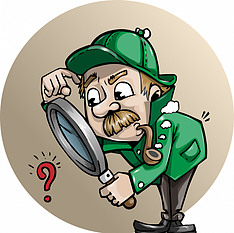 mportant mineral in our dog’s diets. It is responsible for keeping their immune and thyroid systems functioning optimally as well as helping regulate hormones, enzymes, and proteins. Not only does it help immunity, zinc is integral to our keeping our pet’s skin and fur healthy.
mportant mineral in our dog’s diets. It is responsible for keeping their immune and thyroid systems functioning optimally as well as helping regulate hormones, enzymes, and proteins. Not only does it help immunity, zinc is integral to our keeping our pet’s skin and fur healthy.
So, can dogs actually be deficient in zinc?
It is true. Dogs can have a zinc deficiency called Zinc-Responsive Dermatosis. This condition is caused by malabsorption in your dog’s small intestine. It is fairly rare for your pup to have true-zinc deficiency, especially since there are many high quality foods that contain easily absorbed zinc; however, it can happen.
There are three types of Zinc-Responsive Dermatosis.
Type I: This type is generally seen in Alaskan Malamutes and Siberian Huskies; however, it has been reported in Doberman Pinschers, Great Danes, and other breeds. These breeds tend to eat a healthy diet containing adequate zinc, so it is comes down to their intestines being unable to absorb the needed mineral.
This is the type of zinc deficiency Beckham had/has. He had a steady diet of good quality dry food, but also ate mackerel or tuna, eggs, and chicken. Even with these zinc rich foods, his symptoms persisted.
Type II: Fast growing large / giant breed dogs, such as Great Danes, Labrador Retrievers, German Shepherds, and other large breeds are more prone to this type of zinc-responsive dermatosis. According to the VCA Animal Hospital, the main cause of the deficiency is due to supplements; primarily phytates (plant based antioxidants) and calcium supplements, that bind with the mineral keeping the dog’s body from absorbing the needed zinc.
Type III: This deficiency is known as the “generic food disease”. Type III is due to a mediocre or poor diet that does not have enough bioavailable zinc.
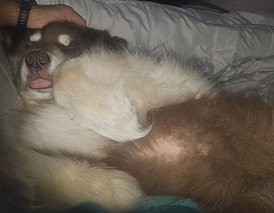
What are the Symptoms of Zinc Deficiency in Dogs?
Common symptoms of zinc-responsive dermatosis can be found on your dog’s skin. You may see lesions, crusting, scaling, and hair loss. Type I symptoms are lesions around the eyes, nose, mouth, scrotum, and in transitional areas between skin and mucous membranes. Type II symptoms are similar; however, your dog may have crusting or scaling on his or her paw pads. Type III symptoms would be similar.
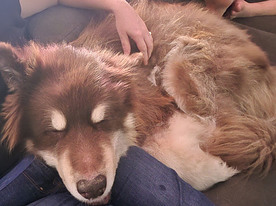
Uncommon symptoms could include:
- Hair Loss (immune system issues)
- Poor appetite
- Lethargy
- Enlarged lymph nodes
- Digestive Issues
- Thyroid problems
- Seizures
How is the Zinc Deficiency Diagnosed?
In Beckh am’s case, he had hair loss, appetite loss, digestive issues, and skin lesions. Before the vet and I knew Beckham had zinc-responsive dermatosis, we tried treating him with different antibiotics and different high zinc diets. We ran blood tests and thyroid tests and everything came back normal!
am’s case, he had hair loss, appetite loss, digestive issues, and skin lesions. Before the vet and I knew Beckham had zinc-responsive dermatosis, we tried treating him with different antibiotics and different high zinc diets. We ran blood tests and thyroid tests and everything came back normal!
One day, I was scrolling through my Facebook feed and came across one of my Alaskan Malamute groups posts regarding this very topic. Beckham ticked off so many of the symptoms listed in the post…so back to the vet we went!
If you are concerned your dog may have zinc-responsive dermatosis, it is imperative to consult with your vet. They will consider your dog’s breed, diet, any blood work that has been done, auto-immune diseases, and then will do a skin biopsy and physical examination.
IMPORTANT: Consult with your vet regarding ANY diagnosis. Researching possible conditions is ok; however, do not..under any circumstance…diagnose your dog yourself. (it’s like searching Web MD for ourselves…we either have cancer or are pregnant, right?)
How to Treat Zinc Deficiency in Dogs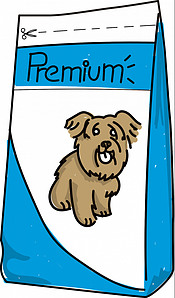
The first step in treating zinc deficiency in dogs is to ensure their diet consists of food that contains adequate bioavailable zinc. If you are feeding your dog dry / wet food, be sure it is high-quality, AAFCO approved foods. Home cooked or raw food diets can include foods such as red meats, chicken, fish, spinach, eggs, etc. Talk to your vet regarding the best options for your dog.
The second step is to consider any supplements that your dog takes. Are any of the supplements prohibiting the absorption of zinc?
Thirdly, your vet may advise on zinc supplements. These are generally given orally; however, your vet may opt to give your dog injections. You can find quality zinc supplements through Howling Dog Alaska’s website or through Amazon. Do your research and consult with your vet to find the best option…especially if your dog will need to take supplements for life.
Lastly, keep a conversation going with your vet if you notice any changes in your dog’s condition. Let your vet know if something is not working. They will be able to help you find the best solution for your dog.
After discussing Beckham’s zinc supplement options with my vet, we opted to purchase Nutrazinc through Howling Dog Alaska. It has made a huge difference in Beckham’s skin and coat. (He now looks like a big bear!) Nutrazinc is not the only option though. I have also used Boreal Nutriceuticals Zinpro Organic Zinc which did a fabulous job. The biggest reason I switched to Nutrazinc is because it came in powder form that I mixed into Beckham’s food. He was just picky and wouldn’t chew the tablets.
Zinc Toxicity?
As with any supplement or medication, dosage is key. Dosage will be determined by your dog’s weight. In general, it will be 25mg of zinc per every 50lbs; however, consult your vet and read the dosage information on the zinc container.
Remember: Zinc toxicity is lethal to your dog, so be sure to give the correct dosage every time. It only takes 1 large dose to cause problems. If your dog exhibits the following symptoms, take him or her to the vet right away. Fur babies with severe poisoning risk heart failure, seizures, organ enlargement, and even death.
Zinc Toxicity Symptoms
- vomiting
- diarrhea
- jaundice
- lethargy
- increased heart rate
- panting
Conclusion
Zinc-responsive dermatosis is not super common; however, it can affect our large/giant and northern breeds. If you suspect your dog may have this condition, consult with your vet right away. The sooner you talk to your vet, the sooner your dog will feel much better!
I know Beckham feels 100% better! His skin is clear, his coat is shiny, and he has gained weight back. He is also able to keep up with his annoying little sister, Chai these days!
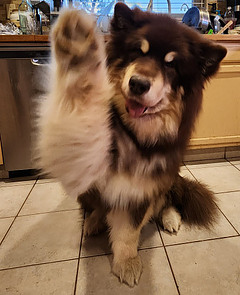
Does your dog have zinc-responsive dermatosis? What do you feed your dog to help alleviate the symptoms? Do they take supplements? I would love to hear your experiences.
Sources cited:
- VCA Hospitals: https://vcahospitals.com/know-your-pet/zinc-responsive-dermatosis-in-dogs
- Howling Dog Alaska; https://howlingdogalaska.com/collections/nutrition
- Animal Allergy and Dermatology of CO: https://animalallergycolorado.com/animal-disease-index/zinc-responsive-dermatosis
- Breeding Business: https://breedingbusiness.com/zinc-deficiency-in-dogs/
- Better Pet: https://betterpet.com/dog-zinc-deficiency/
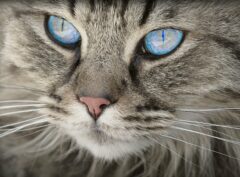
Thank you very much for this valuable detailed post about Zinc Deficiency. This is really a very important post for me. Because I have two dogs. But I don’t know much about these things. I definitely use a good supplement for them. Keep posting like this. I will definitely share this.
Thank you so much for your comments. When giving supplements, be sure to get the ok from your vet as the supplements may prohibit your dog from absorbing other nutrients (like in zinc-responsive dermatosis).
Thanks again!
Incredible article. I love that you posted this. Our fur-babies are so vital to our family structure and sometimes things are overlooked. Most people don’t realize that large breed dogs grow so differently and require different nutrition and different health care. Our K9 family members need knowledgeable Drs and parents who aren’t afraid to think out of the box. Sometimes it’s the little things, like who would have thought Zinc could cause so many problems in dogs! Thank you for sharing!
It is incredible to see what can affect our fur babies. I didn’t even think about a zinc deficiency at first because Beckham eats a high zinc/omega 369 diet…but when he didn’t get better after antibiotics, I started to do a bit of research. In Phoenix, (since it is the desert, haha!) there are not a lot of northern breeds, so sometimes it really does take thinking outside the box to come up with the diagnosis with the vet. Fortunately, my vet has a Malamute as well, so she was extremely knowledgeable on zinc-responsive dermatosis.
The one thing I can’t stress enough is to have an open conversation with your vet and to not take any action until your vet is able to make the diagnosis. Self diagnosis doesn’t always pan out, and we want our pets around for as long as possible!
Thank you so much for your comments!
Hey thanks for this essential information!
Posts like these are great and helpful allowing us to know what to look out for! Dogs can absolutely suffer from deficiencies and since some aren’t aware it makes it even more important to share experiences like this. Well done for taking your concern a step further and getting it checked which now allowed you to come to the knowledge of zinc deficiency.
Thanks for sharing and Have a great day!
Thank you so much! I am so glad I was able to share my experience with you, and I hope it can help you in the future!
I never knew their daily supplements can become a challenge. I love seeing my dog looking roomy. I add supplements to their food. That means I must pay more attention to the ingredients of their supplements and food. And I must be on the watch to see any changes in my dogs.
It is always a good idea to talk to your vet before you add any supplements into your dog’s nutrition. They will know if there can be any adverse reactions or if it is even healthy for your pet. Thanks so much for your comments!
Hey, my dear friend. It was such a piece of great information you shared with us. I have a dog and lately, she didn’t feel normal. We have lots of problems with her hair loss, now when I was reading your article I learned too many details about Zinc deficiency.
Hi Liam, Thank you for the comments. I hope you are able to take your furbaby into the vet and see what is causing her hair loss. It is definitely not fun seeing our beloved pets get sick, especially since they can’t tell us what’s wrong. I hope she feels better soon!
I never knew that dogs could suffer from Zinc Deficiency. I found your article very interesting. As far as the dosage of the supplement you should give your dog, I understood what you said about the dog’s weight, but what about breed? Should we give certain breeds of dogs a specific dosage? Different breeds of dogs can have different dietary requirements. Thus, does the breed have a bearing on the dosage? The second question I have is can cats also become Zinc Deficient? What things should I look for in my cat(s) if they are zinc deficient. I have two cats and want to do everything I can to ensure they have a long and happy life.
As far as I know, there is no difference in breeds when dosing the zinc supplements, but before you administer any dosages, it is important to talk with your vet. They will be able to tell you if your dog should get a difference dosage.
I have not heard of zinc deficiency in cats; however, I am sure that it could happen. One thing I would watch for are any skin changes or fur loss. If you see those in your cats, I would take them to the vet and have some testing done.
Thanks so much for your comments! You ask great questions!
When I hear the word zinc automatically think it refers to us dog owners and not our furry pet friends. This is very interesting as my dog has a bald spot as well and my vet said was nothing to worry about, so I immediately came back home to conduct online research and found your article about Zinc Deficiency. Usually, to get the right vitamins and minerals they need will come from their food, I always try to buy food that promises to supply the vitamins and minerals they need. Zinc deficiency affects the thyroid as well, that is something I learned from your researched article here. I will be taking my pup to another vet now and making sure they do blood tests. Thanks for this great information.
I am glad the article helps! Zinc can definitely affect the thyroid…but what was weird is I had Beckham’s thyroid checked, and everything was normal. When you have your vet look into it, they should be able to do tests to remove any other possibility, but will also do a skin scrape or biopsy to see if it could be a zinc deficiency. It’s at least checking out…just keep an open conversation with your vet! 🙂
Thank you for this well-researched, informative article. I do some rescue work as well as having dogs of my own. And I’m a big believer in ‘Food is the Best Medicine’. I recently put my 11-year-old female mixed breed on taurine supplements, due to early signs of myocarditis. Some of my previous large (30-40 kilo) dogs have died of this, and recent research has linked it to a taurine deficiency… I tried a taurine supplement and it worked amazingly well. She’s not a big dog, rather a small middle-size, so I whittled the dose down to a minimum that works for her. And more amazingly other problems cleared by at the same time! Her eyes had been getting ‘cloudy’ and that’s gone now, and her red, swollen gums, a life-long problem, have turned a normal, healthy pink! So good to see! I’m glad her quality of life can be maintained, she’s such an angel (most of the time). For my male, ex-street dog, I’ve been adding a little ground pumpkin seeds to their (home-cooked) food. He’s around 8 and might have early prostate trouble… One of my previous large dogs also had that… Not nice at all, constant irritation… I have been living (in the EU) in places where good veterinary care is ‘iffy’ at best, and too often non-existent. I have to manage without most of the time, so I’m always glad to find out about nutritional supplements that help problems that we’d otherwise have to treat with ‘medicine’. And, of course, for prostate problems zinc (as in pumpkin seeds) is THE remedy. Thank you!
It sounds like you have done a lot of research into supplements and how they can help your dogs. It is great to hear that your dogs are doing well after finding out that taurine or pumpkin can make the difference in their health.
Food is definitely the biggest culprit in issues like this, so I am curious if a raw food diet is actually better for our pups overall. Take them back to what wolves would eat, etc…obviously with some alterations due to environment, etc.
Thank you so much for your comments!
I thought Zinc deficiency only occurs in humans but it’s interesting that this can also be true for our pet dogs. I am so glad I came across this article because we have 4 dogs; 2 adults and 2 pups. Although I have never seen these symptoms in our family dogs, I have been researching and reading a lot so I would know what to do in case I noticed something different or weird in them.
I was told that most abnormalities in dogs often result from a poor diet and you just confirmed this with your post. Thus, it’s important to give our pets nutritious foods and supplements if necessary.
By the way, does zinc deficiency occur only in large breeds of dogs?
Hi Alice, it is more common in large / giant breed dogs and from what I have seen, mostly in Alaskan Malamutes, Siberian Huskies, Doberman Pinschers, and Great Danes. The flip side is it could probably happen to any dog who has a poor diet.
Thank you so much for your comments!
This is a really helpful post.
This condition, although rare seems like it would be really tricky to diagnose correctly, like many illnesses. It also sounds like there are certain symptoms which relate to human zinc deficiency. Is this the case, or are they totally unrelated in symptoms, treatments etc.
Thank you for such a helpful article
Great question. Zinc deficiency in people can lead to some skin issues (like wounds taking longer to heal) and loss of appetite, etc…so they would be similar, but I am not sure if there are different types in humans like there are dogs. For example, my dog was unable to absorb the zinc, so it wasn’t his diet. I am not sure if it is just diet for humans. It would be a great topic to research!
Hey there, Bernier Smith! Your article on zinc deficiency in dogs is quite informative and eye-opening. As a dog lover, I never thought that a nutrient as essential as zinc could be missing from my furry friend’s diet and causing them a whole host of problems.
Your discussion of the symptoms of zinc deficiency in dogs, such as hair loss, diarrhea, and poor immune function, was especially helpful. It’s easy to overlook these symptoms and assume that they’re just normal for your pup, but knowing that they could be a sign of a larger issue is crucial.
I do have a question, though. You mention that some dog breeds are more susceptible to zinc deficiency than others, but why is that the case? Is it due to their genetics, or is there something in their diet that’s not quite meeting their zinc needs?
Overall, this article was a great reminder of the importance of ensuring that our dogs are getting a well-balanced diet. I’ll definitely be keeping an eye out for the signs of zinc deficiency in my own furry friend. Thanks for the valuable information!
Thanks for the comments! I am not sure why certain dogs are more susceptible to the zinc deficiency. It could definitely be the fact they are considered giant breeds and could be genetic. I don’t believe it is the diet as the northern breed dogs usually get Type I (where the intestines can’t absorb the nutrient). The interesting thing is Beckham’s father and grandfather didn’t have it, nor did his mom and grandma, so I am not sure how he ended up with it. Oh well…he’s healthy now and that is the most important thing!
This article came in handy while researching for care for your dogs. I must admit that I had no idea about fur loss being caused due to Zinc Deficiency. Before reading this article, I couldn’t imagine that even dogs could suffer due to zinc deficiency.
Is there any means of detecting zinc deficiency early on? Is it also effected by seasons?
Thanks for sharing this highly informative article.
Regards,
Rohit
Hi Rohit,
Early detection could be hair loss and appetite loss. If you notice your pup is losing hair or the skin/hair getting crusty and dull, it could be a sign of zinc deficiency. Another sign would be digestive issues, lethargy, etc…It would not be a seasonal issue. However…it is important to talk to your vet in order to make the diagnosis.
Thanks so much for your comments!
Excellent post. Thankyou for sharing such valuable information about Zinc Deficiency in Dogs. This is so important to me since I have a very nice dog that has been part of our family for six years. Even though my dog has not shown any sign of Zinc Deficiency but at least I know what signs to look for. This is definitely a great informational post.
Thank you so much!